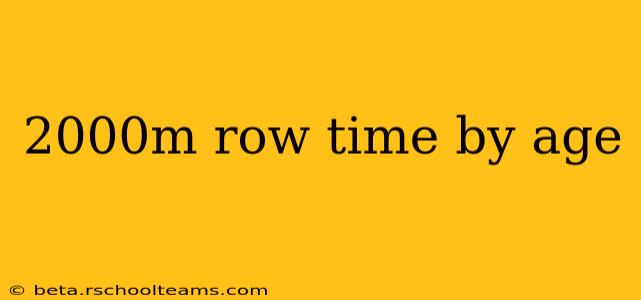2000m Row Time by Age: A Comprehensive Guide to Performance Benchmarks
Rowing, a full-body workout demanding both strength and endurance, sees performance heavily influenced by age and training regimen. Understanding realistic 2000m row time benchmarks by age group is crucial for setting goals, tracking progress, and staying motivated. This guide provides insights into expected times, factors affecting performance, and tips for improvement.
Understanding Rowing Performance Benchmarks:
It's vital to understand that these are benchmarks, not rigid targets. Individual results vary widely due to factors like training intensity, genetics, rowing technique, and equipment. A beginner's time will differ significantly from a seasoned athlete's. The data presented here provides a general framework for comparison. Always consult with a rowing coach or fitness professional for personalized guidance.
2000m Row Time Benchmarks by Age Group (Approximate):
The times below represent average performance levels. Actual times can vary significantly. These are broken down into broad categories for easier understanding. More precise data often requires considering gender as well.
| Age Group | Men (Approximate Time) | Women (Approximate Time) |
|---|---|---|
| Beginner (18-25) | 7:30 - 8:30 | 8:30 - 9:30 |
| Intermediate (18-25) | 6:30 - 7:30 | 7:30 - 8:30 |
| Advanced (18-25) | Under 6:30 | Under 7:30 |
| Beginner (26-35) | 7:45 - 8:45 | 8:45 - 9:45 |
| Intermediate (26-35) | 6:45 - 7:45 | 7:45 - 8:45 |
| Advanced (26-35) | Under 6:45 | Under 7:45 |
| Beginner (36-45) | 8:00 - 9:00 | 9:00 - 10:00 |
| Intermediate (36-45) | 7:00 - 8:00 | 8:00 - 9:00 |
| Advanced (36-45) | Under 7:00 | Under 8:00 |
| Beginner (45+) | 8:15 - 9:15 | 9:15 - 10:15 |
| Intermediate (45+) | 7:15 - 8:15 | 8:15 - 9:15 |
| Advanced (45+) | Under 7:15 | Under 8:15 |
Note: These are broad estimations. Specific times depend on numerous factors.
What factors affect my 2000m row time?
Several key factors influence your 2000m row time. These include:
- Training: Consistent and well-structured training programs are essential for improving performance. This includes strength training, endurance training, and technique drills.
- Technique: Proper rowing technique is crucial for efficiency and power. Poor technique leads to wasted energy and slower times.
- Fitness Level: Overall cardiovascular fitness and muscular strength are directly correlated with performance.
- Age and Gender: As age increases, muscle mass and cardiovascular capacity may naturally decline, impacting performance. Gender also plays a significant role due to differences in physiology.
- Nutrition and Hydration: Proper nutrition and hydration support energy levels and recovery.
- Ergometer Type and Calibration: Different ergometers may have slight variations in resistance, impacting the time recorded. Ensure your machine is properly calibrated.
How can I improve my 2000m row time?
Improving your 2000m row time requires a multi-faceted approach:
- Focus on Technique: Work with a coach to refine your rowing technique. Even small improvements can yield significant results.
- Strength Training: Incorporate strength training exercises to build muscle and improve power.
- Endurance Training: Engage in regular endurance training to build your cardiovascular capacity.
- Interval Training: Interval training sessions help improve both speed and endurance.
- Consistency: Consistent training is vital for progress. Regular workouts, even if short, are more effective than sporadic intense sessions.
- Proper Nutrition and Rest: Fuel your body correctly and allow for adequate rest and recovery.
Is it possible to dramatically improve my 2000m row time?
Yes, with dedicated training and focus on technique, significant improvement is possible, regardless of your current fitness level. Consistent effort, proper coaching, and a personalized training plan are key factors in achieving significant progress.
What is a good 2000m row time for a beginner?
For beginners, a 2000m row time between 7:30 and 9:30 minutes (men) and 8:30 and 9:30 (women) is considered reasonable. Remember that individual results will vary, and this is simply a general guideline.
This guide provides a starting point for understanding 2000m row times by age. Remember to consult with a fitness professional for personalized guidance and to ensure safe and effective training. The key to improvement lies in consistency, proper technique, and a well-structured training plan tailored to your individual needs and goals.
